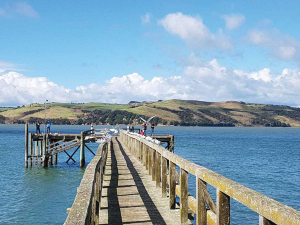Urgent action needed to restore Waikato lakes' health
Waikato is home to a diverse range of lakes, and experts say they urgently need better management and restoration.
 The Northland Regional Council says landowners and community groups are already working to improve the environment, but resourcing has been a constant struggle.
The Northland Regional Council says landowners and community groups are already working to improve the environment, but resourcing has been a constant struggle.
A $300 million project has been signed to try and prevent sediment loss from land to sea at Kaipara Harbour.
The Memorandum of Understanding (MOU) between the government, councils and Kaipara residents recognises an equal partnership between iwi and councils to undertake the Kaipara Moana Remediation Programme.
The programme is predicted to create around 300 new jobs; 200 for direct farm work such as fencing streams and wetlands, establishing water reticulation systems, preparing and planting land, weeding, and hill country stabilisation, and another 100 in the rural sector for nurseries, fencing manufacture, and farm advisory services.
Minister for the Environment David Parker signed the agreement with stakeholders this month.
Joint governance committee chair Tame Te Rangi says the committee will oversee a yet-to-be established entity charged with delivery of the 10-year Kaipara Moana Remediation Programme.
“One of our first priorities will be deciding the spend for the programme’s first year.
“We know there are many strands of the programme that are ready to go now, and these are what we’ll concentrate on first.
“We’re effectively carving out new history – this type of programme has never been done before – so it’s important we get the right logistics and processes in place and balance that with urgent action to give the harbour the help it needs.”
Auckland Mayor Phil Goff describes the agreement as a turning point for the restoration of the Kaipara Harbour.
“It represents all parties coming together to address the siltation and degradation of the Kaipara and the biggest-ever commitment of funds to remediate that damage,” he says.
“It’s a shared commitment to stop the erosion of the land which is devastating New Zealand’s largest harbour, and to begin to restore and preserve the harbour as a major fish-spawning and recreational asset,” Goff says.
Northland Regional Council Chair (and deputy chair of the joint committee) Penny Smart says it is important to recognise that landowners and community groups are already working to improve the environment, but resourcing has been a constant struggle.
The new government funding of $100 million for the first six years will help bring us together and enable large-scale and targeted progress to be made, Smart says.
New Zealand's new Special Agricultural Trade Envoy, Horowhenua dairy farmer, company director and former Minister of Agriculture, Nathan Guy says the Free Trade Agreement (FTA) with India is a good deal for the country.
New figures show dairy farmers are not only holding on to their international workforce, but are also supporting those staff to step into higher-skilled roles on farm.
New tractor deliveries for 2025 jumped 10% compared to the previous year, a reflection of the positive primary sector outlook, according to the Tractor and Machinery Association (TAMA).
Entries have opened for two awards in the New Zealand Dairy Industry Awards (NZDIA) programme, aimed at helping young farmers progress to farm ownership.
Federated Farmers has confirmed interim chief executive Mike Siermans to the role.
Registrations are now open for the 2026 Ruralco Golf Classic, with all proceeds from the event set to support the Mid Canterbury Rural Support Trust.
OPINION: When it comes to New Zealand's foreign relations, Foreign Minister Winston Peters likes to make all the big calls;…
OPINION: Another example of the dairy sector getting shortchanged in free trade deals?